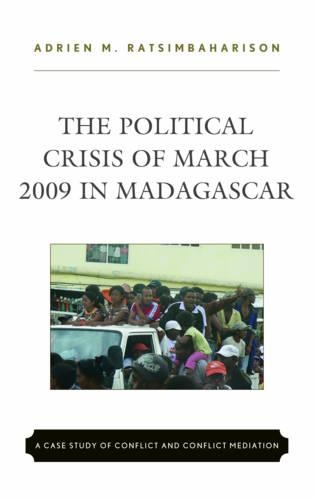
The Political Crisis of March 2009 in Madagascar: A Case Study of Conflict and Conflict Mediation
(Hardback)
Publishing Details
The Political Crisis of March 2009 in Madagascar: A Case Study of Conflict and Conflict Mediation
By (Author) Adrien M. Ratsimbaharison
Bloomsbury Publishing PLC
Rowman & Littlefield Publishers
25th July 2017
United States
Classifications
Tertiary Education
Non Fiction
Peace studies and conflict resolution
303.6909691
Physical Properties
Hardback
188
Width 156mm, Height 240mm, Spine 21mm
458g
Description
Since Independence in 1960, Madagascar has faced several periods of instability and crisis, as well as the threat of civil war. These periods were cyclical: each time the country made some significant economic and social progress, an unexpected crisis would occur to bring it to a halt. The book focuses on the crisis of March 2009, showing how a brewing conflict between the government of Marc Ravalomanana and the opposition led by Andry Rajoelina escalated and using it as a case for the study of further crises in Madagascar or other African countries. The book adopts a conflict approach to the study of crisis. Instead of focusing on external symptoms (street protests, violence, looting, massacre of protesters, military mutiny, etc.), or condemning it as a coup dtat, it analyzes the crisis of March 2009 as part of an ongoing conflict between the government and the opposition. It uncovers the causal mechanisms of the crisis as well as the process of crisis management and de-escalation, examining such factors as the context of the crisis, the major actors, the triggers, and the management of the crisis by national and international mediators. In addition, the book explains how a civil war was averted and who benefited as a result of this political crisis.
Reviews
Ratsimbaharisons book is an excellent contribution to the scholarship on conflict analysis and mediation. . . a must read for conflict-analysts and Africanists. * African Studies Quarterly *
Dr. Ratsimbaharison provides an in-depth, multifaceted examination of the 2009 political crisis in Madagascar by exploring the crisis from several perspectives: the political system in general and its lack of successful liberal democracy, the actors themselves and how each side sought to exploit the situation to its own advantage, and the difficulty of national and international mediators to bring about peace. The book presentsa compellingmain argument that the crisis occurred because a combination of factors escalated an ongoing conflict between the government and the opposition. -- Chris White, Livingston College
This book is essential reading for anyone interested in conflict mediation and in Madagascar's recent history. Ratsimbaharison gives a solid analysis of the political and socio-economic context of the 2009 political crisis in Madagascar. He explains the roles of the mediators , the FFKM (Council of Christian Churches in Madagascar), and the international community through SADC (Southern African Development Community), until the Roadmap for Ending the Crisis is established by the parties in 2011. The book is sure to make readers understand more of the complexity of mediation. -- Wenche Iren Hauge, Senior Researcher at the Peace Research Institute Oslo (PRIO)
Author Bio
Adrien Ratsimbaharison is professor of Political Science at Benedict College, Columbia, SC. He worked as a journalist for Midi-Madagasikara, a daily newspaper in Antananarivo.
